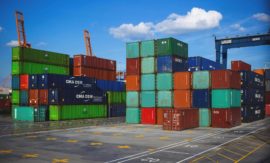Intended learning outcomes: Present circular economy and integral logistics management.
Circular economy is, according to [ASCM22] an economic system intended to minimize waste and maximize the use of resources through a regenerative process.
In addition to forward-looking design, maintenance and repair, this includes reverse logistics, i.e. a supply chain for the reverse flow of the product, such as through returns, disassembly, and recycling. According to Fig. 1.1.8.1, this can lead to a further life cycle — via redesign and remanufacturing to reuse — as another product, if need be.
Fig. 1.1.8.1 Circular economy and multi-connected supply chains.
In the case of capital goods, supply chains can also be interconnected on several levels. The user is then part of another supply chain. This in turn can produce an investment good, and so on. For example, a machine tool is used to manufacture products that are then used to manufacture other machines. Comprehensive circular economy also takes this effect into account. Sections 3.3.3 and 3.3.4 deal with further approaches to the circular economy.
Integral logistics management is the management of the comprehensive supply chain, that is, along the entire product life cycle, within and across companies.
The so-called circular supply chain management, i.e. the integration of circular economy and supply chain management, is thus part of the integral logistics management.
Course section 1.1: Subsections and their intended learning outcomes

1.1 Basic Definitions, Issues, and Challenges
Intended learning outcomes: Produce an overview on terms of the working environment and of business life. Explain service orientation in the classical industry, product orientation in the service industry, and the industrial product-service system. Disclose the product life cycle, the synchronization of supply and demand, and the role of inventories. Produce an overview on supply chain management, the role of planning and control as well as the SCOR model.

1.1.1 Work, Task, Process, Method, Object, etc. — Important Terms of the Working Environment
Intended learning outcomes: Produce an overview on terms of the working environment, such as work, task, function, order, procedure, process, method, object, business.

1.1.1b Value-Added, Business Process, Material, Product, etc. — Important Terms of Business Life
Intended learning outcomes: Produce an overview on terms of business life, such as value-added, business process, business method, business object, goods, item, part, component, material, product, artifact, management, etc.

1.1.2 Service and Servitization — Service Orientation in the Classical Industry
Intended learning outcomes: Present terms of the service domain such as service, customer service, service in the originary sense, servitization. Differentiate between a (primary, or core) product, a product in a broad sense, and a product in the most comprehensive sense.

1.1.3 The Service Industry and Industrialization of Service — Product Orientation in the Service Industry
Intended learning outcomes: Differentiate between service industry and classical (or conventional) industry. Produce an overview on industrialization of service.

1.1.4 The Industrial Product-Service System IPSS (or IPS2)
Intended learning outcomes: Present the industrial product-service system. Explain product-oriented, use-oriented, and result-oriented services as well as their degree of intangibility.

1.1.5 The Product Life Cycle: Design and Manufacturing, Service and Use, Recycling and Disposal
Intended learning outcomes: Differentiate between terms such as logistics, operations, logistic management, operations management, and value-added management.

1.1.5b Logistics, Operations, Logistics Management, Operations Management, and Value-Added Management
Intended learning outcomes: Differentiate between terms such as logistics, operations, logistic management, operations management, and value-added management.

1.1.6 The Customer Tolerance Time (or Demand Lead Time), and the Role of Inventories
Intended learning outcomes: Describe supply, demand, lead time, and customer tolerance time. Explain the problem of temporal synchronization between supply and demand as well as the role of various kinds of inventories in solving this problem.

1.1.7 Supply Chain, Extended Enterprise, and Supply Chain Management
Intended learning outcomes: Describe the reasons for logistics networks, production networks, procurement networks, distribution networks, and service networks. Produce an overview on the supply chain, the extended enterprise and supply chain management.

1.1.8 Circular Economy and Integral Logistics Management
Intended learning outcomes: Present circular economy and integral logistics management.

1.1.9 Supply Chain Planning and the Planning & Control System
Intended learning outcomes: Produce an overview on supply chain planning. Differentiate between production planning and control (PPC) and a PPC system.
